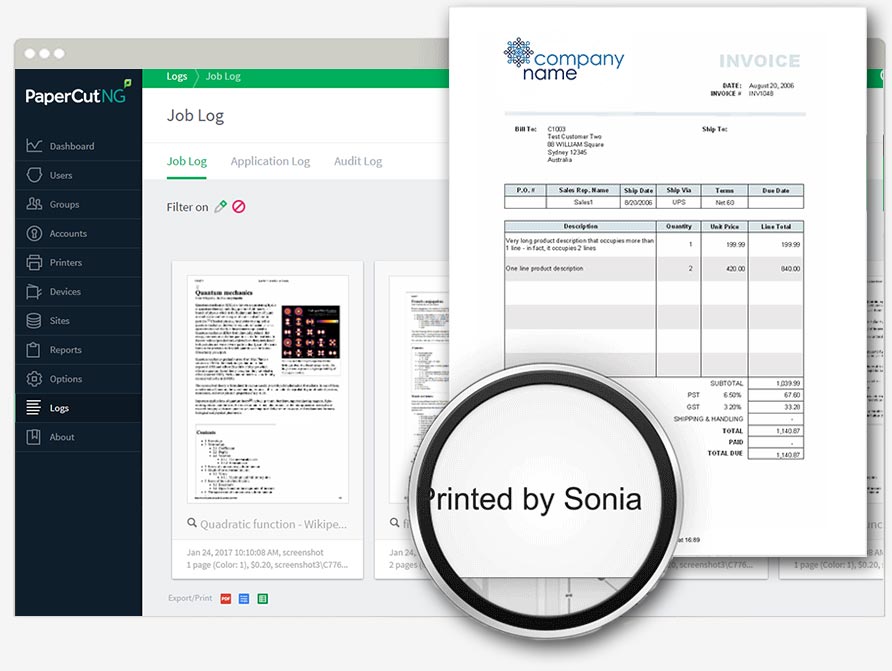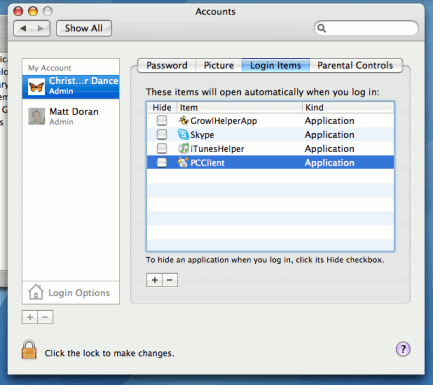
- #PAPERCUT NG USER LOGIN PAGE SOFTWARE#
- #PAPERCUT NG USER LOGIN PAGE MAC#
- #PAPERCUT NG USER LOGIN PAGE WINDOWS#
Any print jobs arriving from this IP address are deemed to be associated with this user. This method involves associating the workstation's IP address with a user for a specified period of time - a session. Popup authentication (IP session based authentication) You cannot force users to change the configuration of their personal laptops. Users log in to their laptop with their personnally chosen username and password. It is too complex to configure authentication on personal laptops.
#PAPERCUT NG USER LOGIN PAGE WINDOWS#
The operating system does not support authentication (like Windows Home editions). These machines might not be able to authenticate to your network for a number of reasons: The use of personal laptops or other unauthenticated workstations in an otherwise authenticated network is another cause of problems. Unfortunately technical reasons often prevent networks from using CUPS authentication or exclusively using the authenticated Microsoft printing protocol. Unlike other printing protocols, IPP also supports access control, authentication, and encryption, making it a much more capable and secure printing mechanism than older ones.) offer some hope, unification in the area of authenticated printing is still some way off. IPP can run locally or over the Internet. It allows clients to send one or more print jobs to the server and perform administration such as querying the status of a printer, obtaining the status of print jobs, or cancelling individual print jobs. (Common Unix Printing System) and the Internet Printing Protocol ( IPP The Internet Printing Protocol (IPP) is an Internet protocol for communication between a print server and its clients. A computer running CUPS is a host that can accept print jobs from client computers, process them, and send them to the appropriate printer. Although initiatives such as CUPS Common User Printing System (CUPS) is a printing system for Unix operating systems that allows a computer to act as a print server.

You can come close to this goal in a 100% Microsoft Windows environment, however, if you mix in Unix, Linux and Mac, it's a different story. In an ideal world, all computers would talk the same protocols and happily work together in a single centrally authenticated environment. Unauthenticated print queues also pose problems in cross platform environments. An extra layer of authentication is required on these systems to correctly identify the person that performs printing. The use of the Window auto-login feature also poses a similar problem - authentication is not enforced at the time of system startup.
#PAPERCUT NG USER LOGIN PAGE MAC#
This practice is particularly common on the Apple Mac operating system as a single login helps streamline system and application management. In these environments administrators ask users to log in to selected systems using standard user names such as "student" or "user". Generic or shared login accounts are seen in some computer lab and network environments. Users' personal laptops that are not authenticated on the network.
#PAPERCUT NG USER LOGIN PAGE SOFTWARE#
The LPR software is installed on the client device.). Many different queue names may exist in one LPD server, with each queue having unique settings. A request begins with a byte containing the request code, followed by the arguments to the request, and is terminated by an ASCII LF character.Īn LPD printer is identified by the IP address of the server machine and the queue name on that machine. A server for the LPD/LPR protocol listens for requests on TCP port 515. LPR The Line Printer Remote protocol (LPR) is a network protocol for submitting print jobs to a remote printer. Unauthenticated print queues or print protocols (e.g. Generic, common, or shared user accounts.

There are a few common scenarios where authentication is not as simple: On fully authenticated networks (like 100% Windows Active Directory networks), PaperCut NG/MF can trust the username associated with the job.

It is this user is charged for for the printing. By default PaperCut NG/MF assumes the printer queues are authenticated and trusts the username that is associated with the print job.


 0 kommentar(er)
0 kommentar(er)
